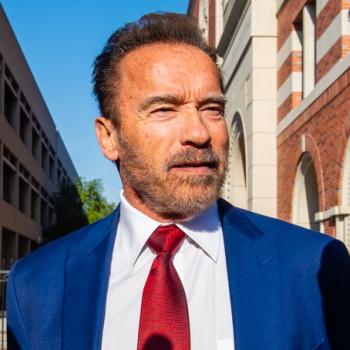Editor's Note: Below is a "Monday Sermon," our attempt at Patheos' Preachers Portal to provide sermons that pastors can enjoy and learn from. It is our hope that this particular series from Daniel Harrell, which preaches through the Church Fathers, will encourage pastors, show them a way of approaching theological education from the pulpit, and refresh their theological memories.
See Reverend Harrell's columnist page for more information.
As human beings, we’re wired to wonder. From the very moment our eyes open and our perception emerges, we’re checking out the environment in order to make sense of our surroundings. Not long after the words come, the verbal questions surface. As toddlers, we just can’t stop asking why, why, why? In time, as we grow and experience more of the world, the questions grow more sophisticated and abstract: “Who am I? Why am I here? Where did I come from? Where am I headed?” These ultimate questions inevitably lead into the realm of theology. Theology is the rational-intellectual inquiry into the nature of God, but this inquiry is hardly limited to pondering God. Theology opens a host of other metaphysical and philosophical doors. From theology you derive your view of the world, of life, and of living.
If you’re a Christian you’re already aware of this. Your view of God does affect your view of practically everything else. But what would happen if suddenly you found out that your view was wrong? What would happen if you suddenly found out that your idea about God what simply something someone had manufactured and that it wasn’t really true at all? What if theology, a purely human endeavor, turned out to be little more than a function of the human imagination? What if theology turned out to be simply a protective cover behind which personal conviction and preference is couched? Is there any real connection between reality and our understanding of it, or is reality merely a product of our perceptions and their accompanying explanations? Basically, how do you know that God is really out there?
Anselm of Canterbury, perhaps the greatest theologian between Augustine and Aquinas, developed one of the most creative answers to this question, one that continues under intense deliberation. Anselm was born of an affluent family in northern Italy around 1033. In 1060 he joined a Benedictine monastery in Normandy of which he was eventually elected abbot. In 1093 Anselm became the archbishop of Canterbury where he continually fought with the King of England over the church’s independence from secular control. This power struggle forced him in and out of exile, during which he wrote prolifically on a host of subjects, among the most notable being his treatise on the incarnation entitled Why God Became Man. Anselm returned to Canterbury for good in 1106 and died on April 21, 1109.
During his abbot years he acquired such a reputation for learning and piety that his monks urged him to write out the meditations and thoughts that had served them so well. Thus, in 1077, Anselm composed his Monologium in which he promoted God’s supremacy of being and reflected upon God’s attributes. This was so enthusiastically received that Anselm followed it up in 1078 with his Proslogium (catchy titles, I know). It was in the Proslogium that Anselm presented his reasoning for the existence of God. Immanuel Kant, the noted 18th century philosopher, labeled Anselm’s line of reasoning as an ontological argument whereby proof for God’s onto (being) was derived from logos meaning logic or reason.
The argument went something like this: God is that about which no greater thought can be thought. Anselm wrote, This definition of God “is indeed so true that it cannot be thought of as not being true. Given that it is quite possible to think of something whose non-existence cannot be thought of. This thing must be greater than something whose non-existence can be thought of. So, if this thing than which no greater can be thought can be thought of as not existing, then that very thing than which no greater can be thought is not a thing than which no greater can be thought. This would be a contradiction. Therefore it is true that there exists something than which no greater can be thought and that this thing cannot be thought of as not existing.” Pretty simple, huh? “O Lord God,” Anselm concluded, “you are this thing so truly that you therefore do exist.”
Okay, let me parse this out for you. First, God is defined as “that than which no greater thing can be thought.” Now the idea of such a being is one thing, but the reality is another thing entirely. Anselm’s point is that the reality (existence) of something is greater than the mere idea (non-existence) of that same thing, just like thinking of a hundred dollar bill is a much different than having one in your pocket. Therefore if the idea of God as the greatest thing is in fact only an idea but not a reality, then it can’t be the greatest thing. Why? Because the reality of God would automatically have to be greater than this idea of God. Therefore the greatest thing has to exist in order for it to truly be the greatest thing. Consequently, God (the real greatest thing) must exist. Get it?





